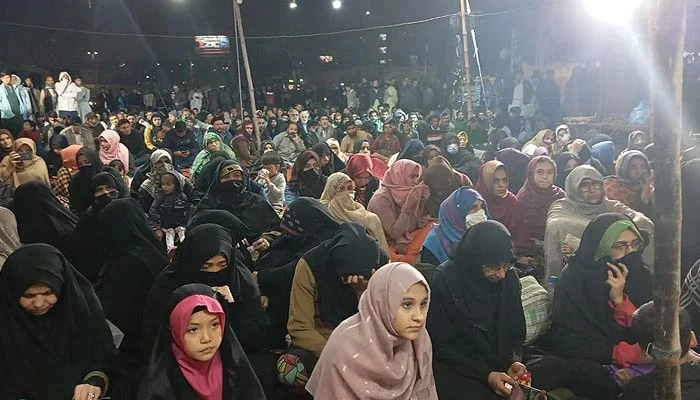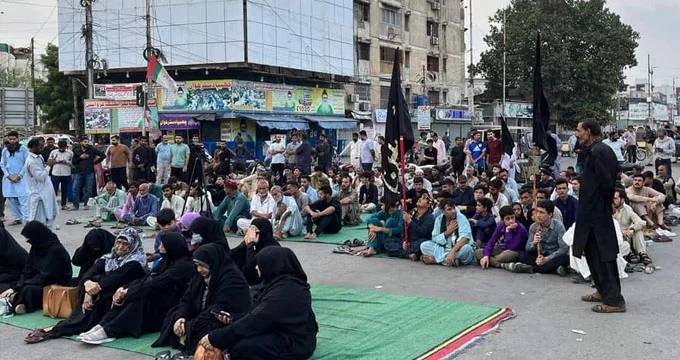In a remarkable show of unity and determination, thousands of people gathered in Karachi under the banner of Majlis Wahdat-e-Muslimeen (MWM) to protest against ongoing injustices and demand accountability from authorities. This large-scale protest reflects the growing frustration of the public over issues such as sectarian violence, the lack of basic rights, and government inefficiency.
Backdrop of the Protest
Karachi, the largest city in Pakistan, has long been a melting pot of cultures and communities. However, in recent years, the city has faced its share of challenges, including a rise in targeted violence, poor governance, and social injustice. MWM, a prominent political and religious organization, has consistently raised its voice against these injustices, advocating for peace, harmony, and equitable treatment of all citizens.
The latest protest was triggered by several pressing concerns, including the lack of action against sectarian killings, delays in providing justice to victims of violence, and the absence of effective measures to ensure the safety of marginalized communities.
Key Demands
The protesters presented a clear list of demands, which included:
- Justice for Sectarian Violence Victims: A transparent investigation and accountability for incidents of targeted killings.
- Improved Security Measures: Strengthening law enforcement to protect communities facing threats.
- Government Accountability: A call for provincial and federal authorities to address governance failures and ensure equitable development across Karachi.
- Protection of Religious Freedom: Safeguarding the rights of all religious and ethnic communities to practice their faith without fear.

Road Closures and Their Impact
The protest caused significant disruptions to traffic flow in Karachi, with several key roads and intersections completely closed, including:
- MA Jinnah Road: One of the city’s main thoroughfares, which became the focal point of the protest.
- Numaish Chowrangi: A key intersection that connects central Karachi to several other areas.
- Shahrah-e-Faisal (Partial Closure): Traffic was heavily diverted, creating bottlenecks.
- University Road and Jail Road: Key routes that faced blockades, causing extended delays.
The road closures led to massive traffic jams across the city, with commuters experiencing delays of several hours. Public transport services were also severely impacted, leaving many daily wage earners and students stranded or unable to reach their destinations. Businesses in the affected areas reported low foot traffic, while some were forced to close temporarily.
Citizens expressed mixed reactions, with many showing solidarity with the protesters but also urging authorities to find ways to manage such demonstrations without paralyzing the city.
Protest Highlights
The protest began with a massive rally at MA Jinnah Road, where participants chanted slogans and carried banners calling for justice and unity. Leaders of MWM addressed the crowd, emphasizing the need for peaceful coexistence and urging the government to take immediate action.
Prominent speakers highlighted the historical resilience of the people of Karachi and their commitment to standing against oppression. “This is not just a protest; it’s a movement for the soul of Karachi and the dignity of its citizens,” said one of the leaders.
Public Reaction
The protest has garnered significant attention on social media, with hashtags like #MWMProtestKarachi and #JusticeForAll trending across platforms. Citizens from all walks of life have expressed solidarity with the movement, praising its peaceful nature and the critical issues it aims to address. However, many have also voiced concerns about the logistical challenges posed by the road closures.
Government Response
While the protest has placed immense pressure on the authorities, the government’s response has been cautious. Officials have assured the public that steps are being taken to address the concerns raised by MWM and other civic bodies. However, many protesters remain skeptical, emphasizing the need for tangible results rather than mere promises.
Conclusion
The MWM protest in Karachi is a testament to the resilience of its citizens and their determination to fight for justice and accountability. It serves as a reminder to the authorities that governance is a responsibility that must be exercised with transparency and fairness.
As Karachi continues to grapple with its challenges, the voices raised in this protest echo a larger desire for peace, unity, and a city that fulfills its promise as the economic and cultural hub of Pakistan. The disruption caused by the road closures highlights the need for better management of such events to minimize the impact on everyday life while still ensuring the public’s right to protest.























